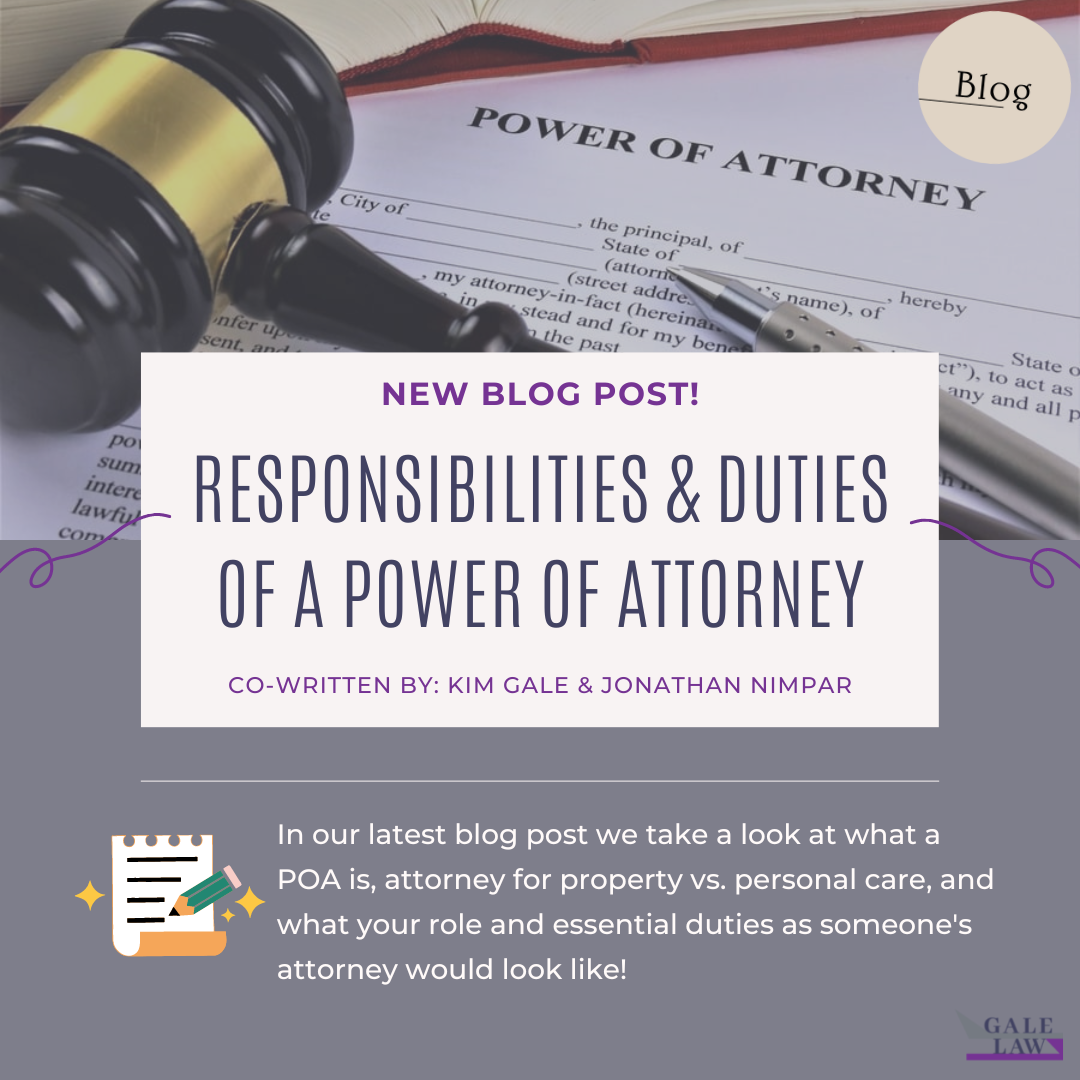
Co-written by: Kim Gale and Jonathan Nimpar
A power of attorney is a document which can be utilized to appoint someone you trust with the authority to handle your property or personal care. This is essentially an authorization given in advance that can be general or limited to specific acts that the attorney is allowed to perform on your behalf. You are the authorizing party (also known as the grantor).
A power of attorney for property can be a continuing power of attorney, meaning it is "active" when signed or it can have a term as to when it is to be invoked by the attorney (e.g. upon the grantor being incapable). A power of attorney for personal care is typically only invocable by the attorney upon the grantor's incapacity.
Responsibilities
The Substitute Decisions Act provides that there are two types of power of attorney in Ontario: property and personal care.
Property
An attorney for property (who is acting pursuant to a power of attorney for property) is authorized to make decisions regarding the grantor's property and finances subject to the conditions and restrictions set out in the power of attorney. These decisions range from paying bills, collecting money owed to the grantor and handling investments.
An attorney for property can essentially do anything regarding their client's property and finances. There are some exceptions we will mention later. The power of attorney can collect debts on the grantor's behalf, settle their bills, sell assets belonging to the grantor, apply for benefits, access bank accounts and even purchase investments for the grantor such as mutual funds, bonds and stocks.
Exceptions
The attorney for property cannot make or amend a grantor's will.
The attorney should ensure to not dispose of any property belonging to the grantor that is a testamentary gift made by the grantor.
Personal care
An attorney for personal care is authorized to make decisions related to grantor's personal care, such as housing, safety, clothing, feeding, hygiene, medical treatment and health care.
If stated in the power of attorney of personal care, this person may have the authority of sharing the grantor's life support measures wishes to the medical professionals if they are unable to do so.
Duties of an attorney
Sections 32 and 67 of the Substitute Decisions Act provide duties on the attorney for property and personal care respectively. The attorney must exercise the powers and responsibilities diligently and in good faith. The attorney must always act to the benefit of the grantor of the power of attorney. In doing so, the attorney is required to consider the values and beliefs of the grantor when making decisions on behalf of the grantor. An attorney is bound to only carry out the functions authorized by the grantor in the power of attorney and by law.
Property
The attorney for property must exercise care and skill of a prudent person when handling their responsibilities. This duty is of significant priority for an attorney handling the financial affairs of a grantor. The attorney must make necessary and essential payments for the health-care support and personal care needs of the grantor as well as that of any legal dependants of the grantor.
The attorney should locate the original will of the grantor to ascertain the property of the grantor that can be disposed of without violating the testamentary gifts. The attorney is permitted to dispose of the property of the grantor in order to comply with her duties as an attorney.
Keep proper records
The attorney must keep proper records of all transactions carried out while diligently managing the financial assets, investments and accounts of the grantor. They must make the records available for inspection at the request of the grantor or the court.
Not dispose of property
The attorney must also ensure that the properties of the grantor are secured and not disposed of unless it is the express wish of the grantor or is necessary to comply with the duties of the attorney.
Maintain family relationships
The attorney should also ensure that the grantor's close family and friends are not estranged from the grantor. It would be expected that the attorney will maintain the good relationship the grantor has with close family and friends. They are also expected to consult with the close family, friends and persons who provide personal care to the grantor on issues relating to care.
Duty to consult
The attorney should try to foster the independence of the grantor as far as possible. They are obligated to encourage the grantor to be involved in any decision-making where possible as it affects the grantor.
A power of attorney does not oust the complete independence and decision-making capabilities of a grantor, provided the grantor can still reasonably appreciate the decisions and consequences.
Big decision
Due to the wide scope of powers and responsibilities afforded to an attorney, it is not an appointment to be made on a whim. Clients are advised to take into consideration the duties listed above before making a power of attorney to avoid an incompetent or negligent person exercising such significant powers on their behalf.
This article was originally published by Law360 Canada part of LexisNexis Canada Inc.
